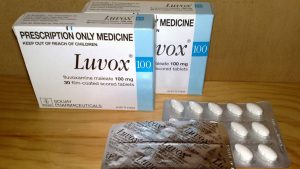It appears that one of the best methods to combat serious illness associated with COVID-19 is not creating a new medication but by repurposing older medications. A new study shows that fluvoxamine, the generic name for Luvox, had a significant impact on reducing hospitalization and morbidity. The Brazilian study, published in Lancet, tracked two groups of subjects with COVID-19, one given fluvoxamine, and the other a placebo.
Researchers found that 11% of the people in the group receiving fluvoxamine were hospitalized compared to 16% in the placebo group. Specifically, the researchers found that “Of the 741 participants who received fluvoxamine, 79 required an extended stay for more than six hours in an emergency setting or hospitalisation, compared to 119 out of the 756 participants who received the placebo.”
This may seem like a small difference, but it’s not. First, that’s a 31% reduction or nearly a ⅓ decrease. So, in a larger scale scenario, say one million people, that would translate into roughly 310,000 people avoiding hospitalization. So significant were the findings that the study was cut short so that the results could be communicated. Study co-author Dr. Edward Mills of McMaster University in Hamilton, Ontario, is very optimistic stating, “If WHO recommends this, you will see it widely taken up,” adding, “We hope it will lead to a lot of lives saved.”
Researchers hypothesize that fluvoxamine works by diminishing the “cytokine storm,” a hyperreactive inflammatory state created by the immune system in response to the virus that COVID-19 elicits in many people. As Angela Reiersen, Associate Professor at Washington University in the US, and co-author of the study explains, “Fluvoxamine may reduce the production of inflammatory molecules called cytokines, that can be triggered by SARS-CoV-2 infection.” This over-response of our immune system is what leads to to a host of severe medical complications, often necessitating the need to place people on ventilators, a last-ditch effort to keep people alive.

Source: sciencenews.org
Fluvoxamine was developed as an anti-depressant and belongs to a class of drugs known as Selective Serotonin Reuptake Inhibitors (SSRIs). SSRIs and their biochemical cousins, selective norepinephrine reuptake inhibitors (SSNIs), work to relieve depression by keeping more serotonin or norepinephrine available in our nervous systems. However, SSRIs and SSNIs also exert an anti-inflammatory effect upon our bodies, which is likely why they reduce the cytokine storm.
And although this may seem like a new discovery, previous studies had already uncovered this phenomenon, pointing to a connection between inflammation and depression. One review of previous studies concluded that “contemporary investigations have revealed that depression is linked with inflammation, and that SSRI/SNRIs possess significant anti-inflammatory actions.” In fact, researchers in this review state that SSRIs/SNRIs “exert anti-inflammatory effects on microglia, the principal cells within the CNS [Central Nervous System] that regulate and respond to inflammatory factors.”
Moreover, microglia “can rapidly respond to pathological insults, becoming activated to induce a range of effects that may contribute to both pathogenesis, or to confer neuronal protection,” according to Pubmed. The upshot of this is that SSRIs, such as fluvoxamine, can attenuate this response and thus prevent our CNS from overreacting to SARS-CoV-2, which could theoretically save lives.
And although multiple antidepressants may help prevent the worsening of COVID-19 symptoms, it appears that not all anti-depressants are candidates in this regard. Angela Reiersen, M.D., M.P.E., an associate professor of child psychiatry at Washington University, thinks there may be a connection to cytokine storms and people who have Wolfram syndrome—a rare inherited disorder characterized by childhood-onset diabetes; vision loss; and neuropsychiatric problems, including anxiety and depression.
Reiersen theorizes that some antidepressants effectiveness at combating inflammation “might be due to the medications’ targeting of a protein called sigma-1 receptor (S1R), which regulates an important cellular stress response to infection that is dysregulated in Wolfram syndrome,” adding “Antidepressants that turned this receptor on seemed to reduce depressive symptoms in patients with Wolfram syndrome, while those that inhibited S1R did not.” In other words, further research should investigate medications that specifically target sigma-1 receptors, such as fluvoxamine.
Reiersen may be on to something. According to Psychiatric News, Nicolas Hoertel, M.D., Ph.D., M.P.H., an associate professor of psychiatry at the University of Paris, noticed that “patients in the geriatric psychiatry clinic where he worked did not seem to be getting as severely ill from COVID-19 as others in the city . . . despite the patients’ being at a higher risk of a poor COVID-19 prognosis given their older age and medical comorbidities.” Acting on a hunch, Hoertel examined medical records from over 7,200 adults who were admitted with COVID-19 to one of the 39 hospitals in Paris’ public hospital system.
The results of the analysis are encouraging because they “showed that hospitalized COVID-19 patients who took antidepressants at the time of their admission were about 40% less likely to die or require intubation than other hospitalized COVID-19 patients” and that “Several SSRIs seemed to offer the strongest protection, particularly fluvoxamine’s close relative fluoxetine, which reduced intubation or death by 70%.”
Fluvoxamine and other SSRIs may prove to be a God-send to poorer countries where access to vaccinations is limited, especially given their wide availability and relatively low cost. “Identifying inexpensive, widely available, and effective therapies against covid-19 is therefore of great importance, and repurposing existing medications that are widely available and have well-understood safety profiles is of particular interest,” points out Dr. Edward Mills of McMaster University, co-principal investigator on the trial.
The results from this study may additionally have downstream implications for those that suffer from “COVID-19 long haul,” a cluster of symptoms characterized primarily by fatigue and respiratory problems “followed by a mix of other issues including what’s being called ‘brain fog,’ body aches and muscle pain, abdominal issues and loss of smell and taste,” according to a study at New York City’s Icahn School of Medicine at Mount Sinai.
Current research indicates that a significant proportion of people will end up with varying degrees of long-haul symptomology. A recent study by Penn State College of Medicine researchers found that “More than half of the 236 million people who have been diagnosed with COVID-19 worldwide since December 2019 will experience post-COVID symptoms . . . up to six months after recovering.” Another study found that approximately ⅓ of the participants developed long-haul symptoms.
Regardless of which study is correct, it is a growing and persistent problem that has challenged doctors and scientists to find effective solutions. As the Penn State researchers argue, “these long-term health conditions may cause increased demand for medical care and could overwhelm health care systems, particularly in low- and middle-income countries.” Furthermore, having COVID-19 long haul is associated with morbidity. In a new study, published in a recent online edition of the journal Nature, researchers found that “survivors of COVID-19 who are considered long haulers had a 59% increased risk of death within six months following initial infection with the novel coronavirus.’
Interestingly, the Penn State researchers also hypothesize that the long hauls symptoms “could result from immune-system overdrive triggered by the virus, lingering infection, reinfection or an increased production of autoantibodies (antibodies directed at their own tissues).” Again, inflammation via the cytokine over-response is a potential culprit, so SSRIs may play a role in moderating this dynamic.
Much more research needs to be done before we know the true effectiveness of fluvoxamine and other antidepressants as COVID-19 therapeutics, but along with new medications such as Tollivar, Molnupiravir, and Monoclonal Antibodies, we are starting to turn the corner on this pandemic, something we can all be happy about.






